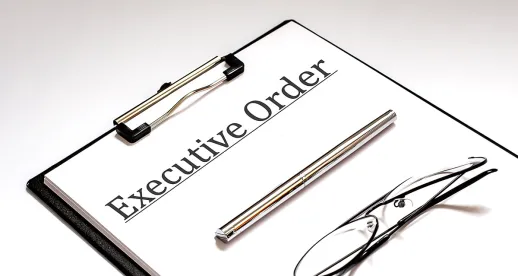Earlier this month — July 9, 2022 — marked the one-year anniversary of President Biden’s Executive Order on Promoting Competition in the American Economy (Executive Order). The Executive Order was notable in its breadth and commitment to a coordinated, “whole-of-government” effort aimed at reinforcing competition across the nation’s economy to protect consumers, workers, and small businesses.
The Executive Order did not immediately put any specific policies into effect; instead, it directed and encouraged federal regulators to consider policy initiatives, conduct a series of reviews, and craft new rules to implement the overarching policy goals of the Administration. Notably, the Executive Order called on the two U.S. antitrust enforcement agencies, the Department of Justice (DOJ) and the Federal Trade Commission (FTC), to “enforce the antitrust laws vigorously” with a focus on labor, agriculture, health care, and technology. As a result, over the past year the DOJ and the FTC, in conjunction with other federal agencies, have engaged in a flurry of activity aimed at curbing perceived “market abuses” that the Biden Administration has characterized as harmful to consumers, workers, and innovation.
This alert provides a high-level survey of key actions taken pursuant to the Executive Order and discusses what other developments or activity may still be forthcoming.
Labor
The Executive Order encouraged the FTC to adopt regulations curtailing the “unfair” use of employee non-compete provisions and occupational licensing restrictions as well as directing the FTC and/or DOJ to consider whether to revise past guidance on the sharing of employee wage and benefit information to prevent potential collusion among competing employers. As it relates to the directive on employee non-compete provisions and occupational licensing restrictions, to date the FTC has taken no concrete rulemaking action. However, the FTC has taken numerous other actions it believes will provide protections for workers. One example includes prohibitions placed on a convenience store franchisor from enforcing non-compete agreements as to any franchisees or employees working or doing business with assets the franchisor agreed to divest in response to a merger challenge. Most recently, on July 19, 2022, the FTC announced it is joining with the National Labor Relations Board (NLRB) in a new Memorandum of Understanding that outlines ways in which the two agencies will work together to share information, conduct cross-training of agency staff, and partner on investigative efforts within each agency’s authority. The DOJ followed suit on July 26, 2022, signing its own Memorandum of Understanding with the NLRB.
As we reported here, the DOJ entered into a similar arrangement with the United States Department of Labor (DOL) in March, signing a Memorandum of Understanding to memorialize a commitment to exchange information either agency uncovers that could trigger an additional investigation by the other agency. The DOJ also continues to examine potential anticompetitive practices in labor markets, including an increase in criminal investigations and prosecutions of no-poach agreements, wage fixing, and other alleged conspiracies in labor markets that DOJ contends are per se violations of the antitrust laws. The DOJ also filed Statements of Interest in two private litigations, seeking to set judicial precedents that would broadly apply the antitrust laws to labor.
Merger Enforcement
Merger enforcementalsowas a key focus of the Executive Order, which criticized corporate consolidation that it characterized as plaguing the U.S. economy and harming consumers and workers as a result. The DOJ and FTC responded to the Executive Order’s encouragement to review the horizontal and vertical merger guidelines by making several changes. First, in September 2021 the FTC unilaterally withdrew from the vertical merger guidelines, approximately one year after the FTC and DOJ had adopted the guidelines. The DOJ declined to follow suit but announced it was “conducting a careful review” of the vertical merger guidelines. Later, Jonathan Kanter, Assistant Attorney General for the DOJ’s Antitrust Division, affirmed that the DOJ shared “the FTC’s substantive concerns regarding vertical merger guidelines.” The same day as Jonathan Kanter’s statements, the FTC and DOJ launched a joint Request for Information on Merger Enforcement (RFI) seeking public comment on modernizing the federal merger guidelines. The RFI sought comments into 15 different categories; however, the agencies emphasized their desire to learn more about “aspects of competition the guidelines may underemphasize or neglect, such as labor market effects and non-price elements of competition like innovation, quality, potential competition, or any ‘trend toward concentration.’” FTC Chair Lina Khan expects the agencies will publish a draft of the updated guidelines by late summer or early fall, with finalized guidelines complete by the end of the year.
The FTC also voted to reinstate its pre-1995 practice of restricting future acquisitions by parties subject to an FTC consent order. Under the reinstated policy, any parties entering into a merger divestiture order with the FTC will need to obtain prior approval from the FTC before closing any future transactions in the relevant markets where the harm was alleged to occur, for a minimum of 10 years. Similarly, buyers of divested assets from an FTC merger consent order must agree to a prior approval for any future sale of the assets, for a minimum of 10 years. In addition, the FTC warned it may seek to pursue a prior approval order in situations where the FTC issues a complaint to block a merger and the parties abandon the transaction.
Health Care
In April of this year, the DOJ and FTC convened a “listening forum” to hear from individuals about the effects of mergers and acquisitions in the health care space. Deputy Assistant Attorney General Andrew Forman spoke about takeaways from that forum and enforcement priorities for the DOJ Antitrust Division in a June 3 speech. Forman spoke about concerns from nurses, physicians, pharmacists, and patients that consolidation in the industry has resulted in “the reduction of research, staffing shortages, and decreased quality of care.”
Forman singled out private equity firms with “an undue focus on short-term profits and aggressive cost cutting,” and he described specific areas for future enforcement affecting health care private equity transactions. Those areas included a focus on private equity rollups that may have the effect of lessening competition, greater consideration of whether focus on short-term gain chills competition and innovation, potential additional enforcement under Section 8 of the Clayton Act for improper board of director interlocks, and greater scrutiny of compliance with the Hart-Scott-Rodino Act.
In addition to private equity, the DOJ is focused on potential misuse of health care data to create barriers to entry, restrict the flow of data in anticompetitive manners, or use data for anticompetitive purposes. The Division is also concerned about “entanglements” created by joint ventures and affiliations between should-be competitors that could damage competition. In particular, the health care industry has been the focus of several enforcement actions related to restrictions on labor markets created by alleged no-poach agreements. The DOJ has made clear that the bar for approval of remedies such as divestitures in merger cases is extremely high in the health care sector.
Pharmaceuticals
In addition to the priority items addressed in the Forman speech discussed above, the pharmaceutical industry has received special additional attention from both the DOJ and the FTC in the past year. In June, the FTC and DOJ hosted a two-day virtual public workshop focused on analysis of pharmaceutical mergers, during which FTC Commissioner Rebecca Slaughter spoke about the need for the agencies to look more closely at competitive harms to innovation and research and development in analyzing mergers, going beyond traditional analysis of existing and pipeline products. That same month, the FTC announced an investigation into pharmacy benefit managers (PBMs) under section 6(b) of the FTC Act. The FTC has also highlighted its efforts alongside several state co-plaintiffs to obtain a lifetime ban from the pharmaceutical industry of “Pharma Bro” Martin Shkreli while recouping millions of dollars for alleged victims of a purported scheme to monopolize a drug used to treat toxoplasmosis.
Manufacturing
Many of the government’s enforcement efforts since the Executive Order have focused on the manufacturing sector and the supply chains that feed it. These actions have ranged from informal studies of certain industries to investigations and complaints. Last fall, the FTC ordered nine large retailers, wholesalers, and consumer good suppliers to “provide detailed information that will help the FTC shed light on the causes behind ongoing supply chain disruptions and how these disruptions are causing serious and ongoing hardship for consumers and harming competition in the U.S. economy.” The FTC issued the orders under Section 6(b) of the FTC Act, which authorizes the Commission to conduct wide-ranging studies and seek various types of information without a specific law enforcement purpose. The FTC has in recent months made increasing use of 6(b) orders and, we expect, may continue to do so. The FTC has also launched an investigation into shortages of infant formula, including looking for anticompetitive practices that have contributed to or are worsening this problem.
In February, the DOJ and FBI announced an initiative to investigate and prosecute companies that exploit supply chain disruptions to overcharge consumers and collude with competitors. The announcement warns that individuals and businesses may be using supply chain disruptions from the COVID-19 pandemic as cover for price fixing and other collusive schemes. As part of the initiative, DOJ is “prioritizing any existing investigations where competitors may be exploiting supply chain disruptions for illicit profit and is undertaking measures to proactively investigate collusion in industries particularly affected by supply disruptions.” The DOJ has cited the initiative as an example of the kind of “proactive enforcement efforts” firms can expect from the Antitrust Division going forward. As the Deputy Attorney General for Criminal Enforcement put it in a recent speech, “(T)he division cannot and will not wait for cases to come to us.”
The FTC has also taken aim at “repair restrictions,” limitations that manufacturers place on the ability of consumers and businesses to fix their own products — such as using adhesives to make parts more difficult to replace, limiting the availability of parts and tools, and making diagnostic software unavailable. In a July 2021 policy statement, the Commission vowed to “scrutinize repair restrictions that violate the antitrust laws,” noting certain repair restrictions may constitute illegal tying arrangements or monopolistic practices, like exclusive dealing. This month, the FTC filed an administrative complaint against Weber-Stephen Products, LLC, alleging the grill maker imposed illegal warranty terms that voided consumers’ warranties if they used or installed any third-party parts on their grill products. These actions are directly traceable to the Executive Order, which singled out “repair markets” as an area vulnerable to abuses of market power and called on the FTC to remedy “unfair anticompetitive restrictions on third-party repair or self-repair of items, such as the restrictions imposed by powerful manufacturers. . . .”
Food and Beverage
As we reported here, the Executive Order included initiatives related to the food and beverage industries. In particular, the order directed the FTC and Secretary of Agriculture (USDA) to submit a report “on the effect of retail concentration and retailers’ practices on competition in food industries.” That report is still forthcoming, with the public comment period having closed in June. The Administration has meanwhile taken various actions in the food space, most notably in the meat and poultry-processing sector. The White House has cited the sector as a “textbook example” of how concentration harms consumers and called for “bold action to enforce the antitrust laws [and] boost competition in meat processing.” To that end, the USDA and DOJ conducted a joint investigation into potential price fixing in the chicken processing industry, which led to a $107 million guilty plea by one chicken producer, several indictments and, earlier this month, multiple acquittals. The agencies also entered into a statement of principles and commitments, pledging to “vigorously enforce” the antitrust laws and providing for the development of a process for farmers, ranchers, growers, and other producers to submit complaints about potential antitrust violations. Separately, the DOJ announced on July 25, 2022, that it filed a civil lawsuit against a data consulting firm and its president, as well as three poultry processors, alleging that these parties engaged in a conspiracy to suppress wages and benefits for poultry processing plant workers. The DOJ also filed proposed consent decrees that, if approved by the court, will prohibit the parties from sharing competitively sensitive information about plant workers’ compensation and pay $84.8 million in restitution.
New Industries and Technologies
Anotherprime focus of the Executive Order included addressing the competition challenges posed by new industries and technologies, most notably those raised by large internet platforms and “Big Tech” companies. Specifically, the Executive Order called out serial mergers, the acquisition of nascent competitors, the aggregation of data, unfair competition in attention markets (markets that hinge on user attention), the surveillance of users, and the presence of network effects as challenges needing reform.
One legislative item that appears to have the backing of the Biden Administration includes draft legislation that would change the way large online platforms and other companies are regulated. The American Innovation and Choice Online Act would, among other things, prohibit online platforms with 50 million or more U.S.-based monthly active users from preferring its own products or services above those of other business “in a manner that would materially harm competition.” For violations, the act authorizes the DOJ, the FTC, and state attorneys general to seek monetary and injunctive relief.
In another move in furtherance of the Executive Order, and one that will have implications for companies operating in the technology sector and, as we previously reported here, the DOJ, the U.S. Patent and Trademark Office (USPTO), and the National Institute of Standards and Technology (NIST) withdrew — without replacing — a Trump-era policy statement issued in 2019 (2019 Policy Statement) regarding the scope of available remedies for the infringement of standard essential patents (SEPs) subject to fair, reasonable, and non-discriminatory (FRAND) royalty commitments. Other than a statement by the DOJ that it would evaluate SEP licensing practices on a case-by-case basis, by scrapping the 2019 Policy Statement without issuing any replacement, the agencies leave SEP holders and SEP implementers with less clarity regarding how these agencies will treat SEP licensing issues. This includes guidance as to when the government may step in or seek to hold SEP holders/implementers accountable under the antitrust laws for conduct related to standards setting activities.
Conclusion
These actions over the past year make clear that the Executive Order’s “whole-of-government” approach to competition issues remains a top Biden Administration priority. Companies and individuals should continue to monitor closely the various mandates set out in the Executive Order and anticipate competition-related inquiries from not just the DOJ and FTC but also a wide variety of other federal agencies. Moreover, given the continued enhanced antitrust scrutiny of all manner of commercial activities, companies should ensure they have an effective antitrust compliance program in place that helps detect and deter anticompetitive conduct.
James T. McKeown, Benjamin R. Dryden, Alan D. Rutenberg, Melinda F. Levitt , Michael A. Naranjo , Richard L. Flannery , Gregory E. Neppl contributed to this article







 />i
/>i

